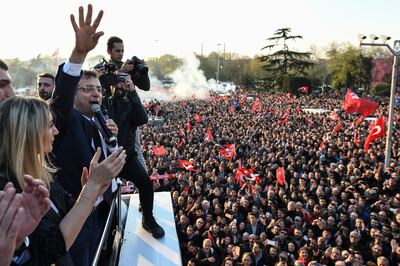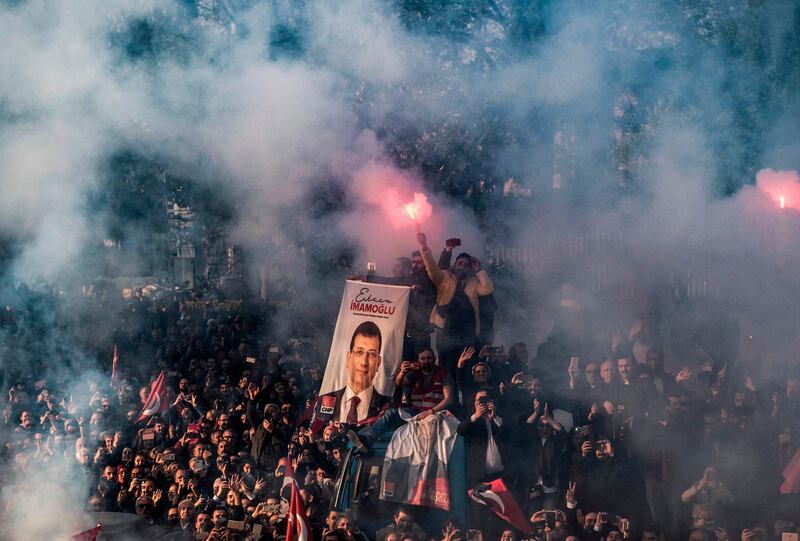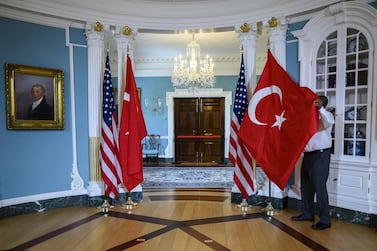After more than two weeks of fraud allegations and recounts, the opposition candidate for the Istanbul mayor’s office has been officially recognised but the possibility of a re-run still looms.
Ekrem Imamoglu received the mandate for Turkey’s largest city late on Wednesday after a series of recounts showed him 13,729 votes ahead of his rival from the ruling Justice and Development Party (AKP), which a day earlier had lodged a petition to annul the poll.
If upheld by the election board, the AKP’s “extraordinary objection” could see Istanbul hold a fresh mayoral election on June 2.
Profile: Who is Ekrem Imamoglu?
Arguments over the nationwide March 31 polls had been most prominent in Istanbul, where Mr Imamoglu’s victory was subjected to AKP allegations of widespread irregularities across the city of 15 million.
Thousands of people headed to the municipal offices to congratulate Mr Imamoglu, the 48-year-old candidate of the Republican People's Party (CHP), after he received the mandate, or "mazbata", to run Istanbul for the next five years.
However, the AKP's petition cast a cloud over proceedings with the electoral authority expected to make a decision in the next few days.

Recounts in several Istanbul districts, the last of which was completed early on Wednesday, reduced Mr Imamoglu’s initial lead of around 28,000 votes over the AKP’s Binali Yildirim, the former prime minister.
While objections and recounts had sprung up across Turkey, attention focused on the country’s commercial hub that is home to nearly a fifth of the country’s 79.8 million people.
Istanbul and the capital Ankara, where a CHP mayor has also taken office, had been run by the AKP or its political predecessors for 25 years.
President Recep Tayyip Erdogan achieved national prominence when he was Istanbul mayor in the 1990s.
Defeat for the AKP, which has ruled Turkey since 2002, is a major setback that comes on top of the loss of several other large cities despite the party and its nationalist allies winning more than half the vote nationwide.
Mr Erdogan is among those who have repeatedly stressed the city's importance in running the country.
"Whoever wins Istanbul, wins Turkey," the president told campaign rallies before the vote.
One of the key districts in the recounting process was Buyukcekmece, on Istanbul’s western outskirts where the AKP claimed widespread fraud favoured the CHP. The accusations led to police raids on suspect addresses.
In an unusual accusation, the party’s district candidate claimed voters who could have been “easily identified” as AKP supporters by their surnames were removed from the electoral roll.
“If all the votes in Istanbul were recounted, this election would have resulted in our favour,” AKP deputy chairman Ali Ihsan Yavuz said after submitting the petition alongside three suitcases of documents purporting to show voting irregularities.
If the mayoral race is rerun, the votes cast for the city's 39 municipalities – 24 of which were won by the AKP – local councils and other elected officials will still stand.
On top of the re-run petition, Mr Yavuz announced that the AKP would also file a criminal complaint about vote-rigging whether the electoral authority’s decision is “positive or not”. He also suggested the need for electoral reform without giving further details.
Mr Yavuz said the voting process had been undermined by officials and others linked to the outlawed Gulenist movement, an Islamic network allied to the AKP until a split in the early 2010s and which is accused of orchestrating a 2016 coup attempt. “I have never seen such a massive and organised plot,” Mr Yavuz said about alleged voting irregularities.
However, the ruling party’s claims of election fraud rang hollow for many opposition figures, who in the past saw similar complaints levelled at the AKP dismissed.
“When the AKP wins there’s no fraud but when an opposition party wins, somehow there is fraud,” said Meral Aksener, leader of the CHP-allied Iyi Party.
Despite the AKP’s objections, some senior figures within the party, including Mr Yildirim and former President Abdullah Gul, appeared to concede defeat in Istanbul.
Should the AKP succeed in getting a re-run, it remains unclear whether it could win a second poll across Istanbul amid public frustration at the wrangling.
Over the weekend, two Istanbul football derbies rang to the chants for Mr Imamoglu to be granted the mayoral mandate.
Meanwhile, Mr Imamoglu has kept himself in the public eye with news conferences and appearances across the city.
There are also concerns for the international reputation of Turkey as it faces a number of disputes with Western allies such as the row over the purchase of a Russian missile system.
“Already suffering from its image as a downgraded democracy, the annulment of the Istanbul polls would further deteriorate it and launch questions over its legitimacy,” said Serkan Demirtas, a columnist for the Hurriyet newspaper.
The economic impact of electoral uncertainty is another worry in a country where unemployment is the highest level in a decade and the inconclusive election outcome saw the lira slide to a six-month low against the US dollar.
“Turkey needs another election campaign like a hole in the head,” said Timothy Ash, an economist at BlueBay Asset Management in London. “It means months more of uncertainty, polarisation and loose macro [economic] policy.”






